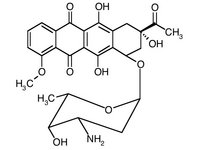Drug for Adults with Leukemia
A new drug offers hope for a better outcome for adults with a rare but deadly form of cancer, acute myeloid leukemia.
FDA approved the drug, idarubicin hydrochloride, in October 1990. The drug was given orphan product status because it is used to treat a condition that affects fewer than 200,000 people in the United States. (Firms are provided financial incentives to develop products to treat rare diseases.)
Idarubicin was studied in 574 patients at three centers in the United States. Two of the studies showed that patients receiving idarubicin and another cancer drug, Ara-C, had a higher rate of disease remission and longer survival than those given the standard therapy, daunorubicin and Ara-C. Drug side effects, which included bone marrow suppression, infections, and hair loss, were similar in both groups.
Acute myeloid leukemia is a cancer of immature granulocytes (a type of white blood cell). Patients suffer infections and bleeding because of a decrease in mature white blood cells and platelets.
Idarubicin hydrochloride will be marketed by its manufacturer, Adria Laboratories, under the brand name Idamycin.
COPYRIGHT 1991 U.S. Government Printing Office
COPYRIGHT 2004 Gale Group



